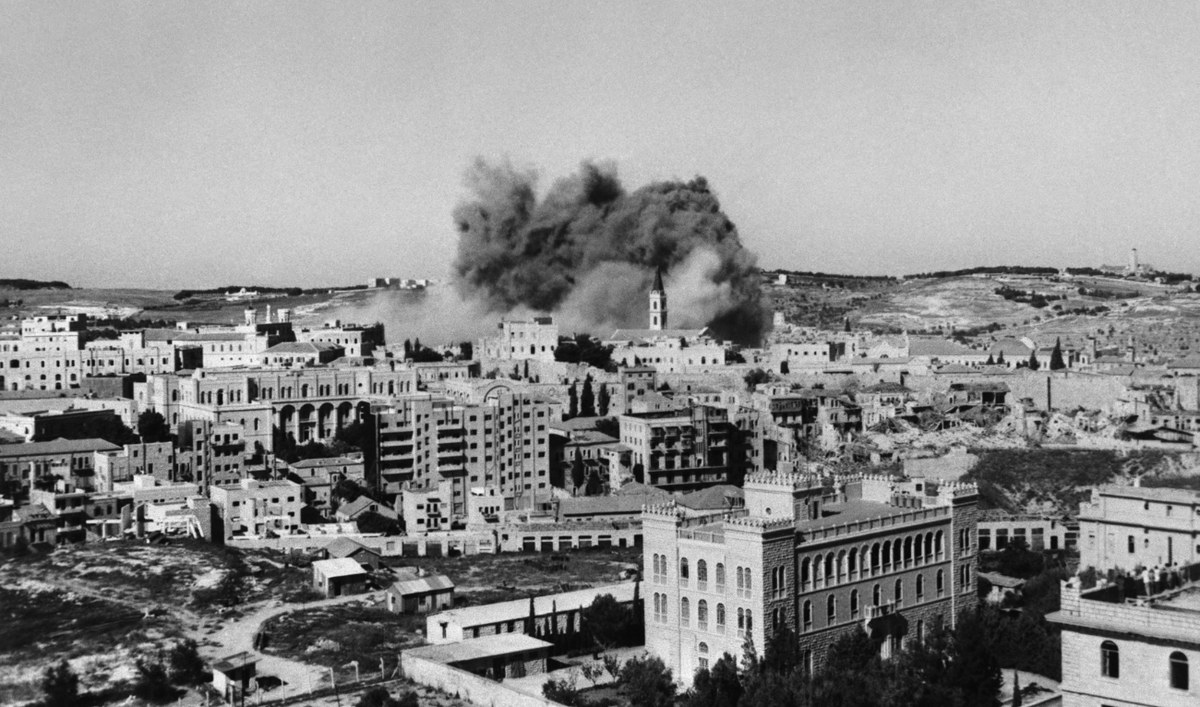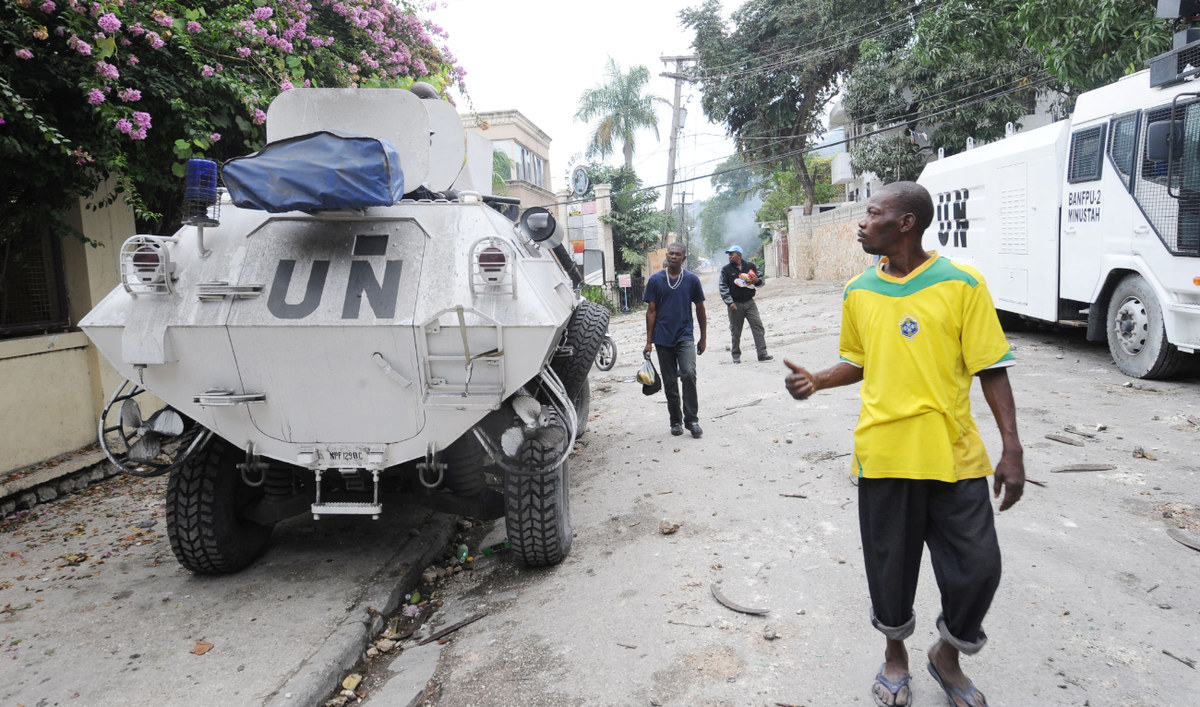LONDON: At 6 p.m. on June 19, 1948, two chartered aircraft took off from La Guardia Airfield in New York State. On board were 49 volunteers, uniformed members of the UN guard force stationed at Lake Success, the temporary home of the fledgling UN on the north shore of Long Island.
Bound for Cairo, their ultimate destination was Palestine, where they would help to write the first chapter in the mottled history of UN peacekeeping efforts.
The small force, dispatched on the orders of Norwegian politician Trygve Lie, the first secretary-general of the UN, had been requested by Count Bernadotte, the UN mediator for Palestine.
Its role was to help Bernadotte to supervise the Israeli-Palestinian truce and, in the words of the UN press release at the time, it was “expected to be used primarily to supervise application of the truce provisions relating to the supply route from Tel Aviv to Jerusalem.”

Jewish and Palestinian leaders and a representative of the United Nations talk to find an agreement regarding a cease-fire in Palestine in 1948. (Getty Images)
As the men boarded the two aircraft, Lie wished them “a pleasant voyage and a safe return,” shook each one of them by the hand and told them: “I am confident you will do your duty in the cause of peace.”
For the first but not the last time in the history of the UN, the organization was sending peacekeepers into impossible situations in which they would struggle to keep two warring factions apart, often at the cost of their own lives.
As the UN observed as it held its annual memorial service on June 6 this year: “Serving the cause of peace in a violent world is a dangerous occupation.”
Perhaps the most telling fact about the 76 years of UN peacekeeping operations is that that very first mission, which came to be known as the UN Truce Supervision Organization, has continued ever since, with the situation for which it was created still unresolved.
Since 1948 more than 2 million men and women have served under the UN flag in more than 70 peacekeeping operations, in which more than 4,300 of them have been killed. The UN says “their sacrifice on behalf of the international community is one of the most concrete expressions of the UN Charter’s determination ‘to save succeeding generations from the scourge of war’.”

Smoke raises from the Old city of Jerusalem in August 1949, during the Arab–Israeli War. (AFP)
The first of those deaths occurred just over two weeks after the guards from Lake Success arrived in Palestine. On the evening of July 5, a French observer, Commandant Rene Labarriere, was fatally wounded in an explosion while returning from investigating an alleged violation of the truce provisions by Jewish forces.
Then, just over two months later, on Sept. 17, 1948, a cablegram arrived at the office of the UN secretary-general in New York.
It read: “Count Folke Bernadotte, United Nations mediator on Palestine, brutally assassinated by Jewish assailants of unknown identity, in planned, cold-blooded attack in the new city of Jerusalem.”
Bernadotte, a Swedish diplomat who in 1945 had negotiated the release of 450 Danish Jews and 30,000 other prisoners from a Nazi concentration camp in Czechoslovakia, had been murdered by the Stern Gang, a group of Zionist terrorists.

Delegates of the UN Security Council gathered at the Palais de Chaillot, in Paris, on September 18, 1948, pay a silent tribute to assassinated Count Folke Bernadotte. (AFP)
Since then, in a blizzard of acronyms, the UN has launched no fewer than 72 peacekeeping missions around the world, often at great cost to the participating nations and, at times, to the UN leadership itself.
In 1961 Secretary-General Dag Hammarskjold and 15 others died in a plane crash in the Congo while on a peace mission as part of the UN Operation in the Congo.
Three decades later, the growing number and scale of UN peacekeeping missions in the 1990s “put many more at risk,” the organization acknowledges — more lives were lost in that decade than in the previous four combined. Since the early 2000s there have consistently been more than 100 deaths every year among peacekeepers.
In the new millennium, the UN itself became a target.
On Aug. 19, 2003, the headquarters of the UN Assistance Mission in Iraq in Baghdad’s Canal Hotel was hit by a truck bomb that killed 22 people, including the then High Commissioner for Human Rights Sergio Vieira de Mello. Most of the UN’s 600 personnel were withdrawn from Iraq after the attack.

UN cars are piled in a field on August 23, 2003, next to the destroyed United Nations headquarters at the Canal Hotel in Baghdad. (AFP)
Other attacks against UN missions followed, claiming dozens of lives in Algiers in 2007 and Kabul in 2009.
Occasionally, UN peacekeeping missions are marred by terrible ironies and unintended consequences. In 2010 more than 20 members of the UN Stabilization Mission in Haiti died in the devastating earthquake that hit the country, killing as many as 300,000 people.
It emerged later through genomic testing that the cholera epidemic that followed the earthquake, claiming tens of thousands of more lives, had most likely originated among the Nepali members of the peacekeeping force.
In 2016 the UN Secretary-General Ban Ki-moon, apologized, saying: “We simply did not do enough with regard to the cholera outbreak and spread in Haiti. We are profoundly sorry for our role.”

In 2010 more than 20 members of the UN Stabilization Mission in Haiti died in the devastating earthquake that hit the country. (AFP)
Today, there are 11 UN peacekeeping missions underway around the world — five in Africa, one in India and Pakistan (since 1949), one in Kosovo (1999), one in Cyprus (1964), one in the Golan (UNIFIL, since 1978) and the very first, in Palestine (UNTSO).
Since 1948 the UNTSO mission has suffered 52 fatalities. As of March 2024, there were 998 UN personnel deployed, headquartered at Government House, Jerusalem.
UNIFIL (UN Interim Force in Lebanon) was originally created in March 1978 to “confirm Israeli withdrawal from Lebanon, restore international peace and security and assist the Lebanese Government in restoring its effective authority in the area.” That mandate has since been adjusted twice.
Following the Israeli-Hezbollah war in July and August 2006, the Security Council enhanced the force and charged it with monitoring the cessation of hostilities, a mission that since 1978 has cost the lives of 334 personnel from many countries.
Today, over 10,000 troops are deployed, based in Naqoura, Lebanon, supplied mainly by Indonesia, India, Italy, Ghana, Nepal, Malaysia, and Spain.

A UNIFIL patrol drives past the wreckage of a car that was targeted in an Israeli strike early on March 2, 2024, near the southern Lebanese town of Naqoura. (AFP)
Whether the UN’s peacekeeping endeavors have saved lives is open to debate. Certainly, the UN believes they have.
It says that peacekeeping, based on three basic principles — consent of the parties, impartiality, and “non-use of force except in self-defense and defense of the mandate” — has proved to be “one of the most effective tools available to the UN to assist host countries navigate the difficult path from conflict to peace.”
Studies show, it says, that “more UN peacekeepers in conflict areas means fewer civilian deaths, less violence and a higher chance at lasting peace.”
But not always.
One of the darkest episodes in the history of UN peacekeeping occurred in 1994, after the UN Assistance Mission for Rwanda had been sent to implement a peace agreement between the Hutu government and the Tutsi-led Rwandese Patriotic Front, which had been fighting since 1990. It fell apart in April 1994, when an aircraft carrying the presidents of Rwanda and Burundi crashed in mysterious circumstances, triggering a tidal wave of political and ethnic killings.
The UN peacekeepers largely stood by as more than 800,000 Tutsis were massacred. The commander of the UN mission, Canadian Gen. Romeo Dallaire, later published a damning critique of the under-resourced and under-manned mission that had ended in disaster.

Government soldiers stand by on June 18, 1994, as some Tutsi refugees are evacuated by UN soldiers from the Mille Collines hotel in Kigali, which had been attacked 17 June by Hutu militiamen. (AFP)
“Shake Hands with the Devil: The Failure of Humanity in Rwanda” included an account of the murder of 10 Belgian paratroopers Dallaire had assigned to protect Rwanda's prime minister.
One year later, disaster struck again in Srebrenica, an enclave of 60,000 Bosnian Muslims within Bosnia and Herzegovina which the UN had declared to be an internationally protected “safe area.”
The UN Protection Force assigned to protect the enclave was a 370-strong Dutch battalion which, badly prepared and outnumbered, failed to prevent the genocidal massacre of over 8,000 men and boys by Bosnian Serb troops.
A Dutch investigation later concluded the Netherlands and the UN had failed to do their duty. It accused the government and the military leadership of the Netherlands of criminal negligence.

A peacekeeper from the Netherlands posing at the Charlie chekpoint in Srebrenica on April 1995. (AFP)
The UN has, however, claimed successes for its peacemaking operations. In 1988 the Nobel Peace Prize was awarded to UN peacekeeping forces which had “under extremely difficult conditions, contributed to reducing tensions where an armistice has been negotiated but a peace treaty has yet to be established.”
The UN forces, the citation continued, “represent the manifest will of the community of nations to achieve peace through negotiations, and the forces have, by their presence, made a decisive contribution toward the initiation of actual peace negotiations.”
Occasionally, the UN has felt obliged to defend the reputation of its peacekeeping missions and in 2022 commissioned an independent review of its work by Lise Howard, professor of government and foreign service at Georgetown University in Washington.
“Failures on the part of UN peacekeeping missions have been highly publicized and well documented — and rightly so,” commented the UN at the time.
“But if you look at the overall picture and crunch the data, a different and ultimately positive picture emerges.”

Members of the UN Peacekeeping Force in Cyprus (UNFICYP) take part in a ceremony marking the 60th anniversary of their presence on the eastern Mediterranean island, on March 4, 2024. (AFP)
Howard reviewed 16 peer-reviewed studies and concluded that in the majority of cases the Blue Helmets had significantly reduced civilian casualties, shortened conflicts and helped to make peace agreements stick.
“Most of the time peacekeeping works,” Howard said on the publication in 2022 of her findings in the book “Power in Peacekeeping.”
In a video released by the UN, she said: “If we look at the completed missions since the end of the Cold War, two-thirds of the time peacekeepers have been successful at implementing their mandates and departing.
“That’s not to say that in all of those cases everything is perfect in the countries. But it is to say that they’re no longer at war.”


























